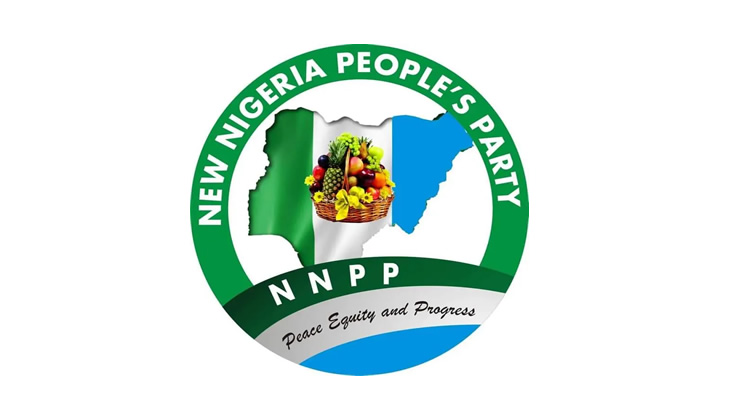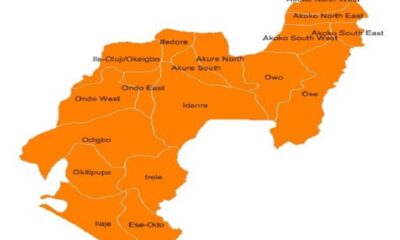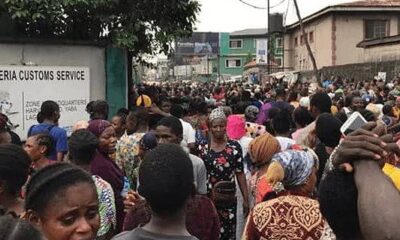Politics
‘It’s A Waste Of Time’: Residents Boycott Ondo LG Polls
Apathy overshadowed Saturday’s local government elections in Ondo State, as many residents failed to participate in the electoral process, citing a lack of confidence in its impact.
Reports revealed that polling centers across the state recorded minimal activity.
In Okitipupa, residents were seen carrying on with their daily routines, with some staying indoors and others engaging in business as usual.
READ MORE: Obong Victor Attah Accuses Obasanjo Of Blocking Power Distribution In Akwa Ibom
Private and commercial vehicles, as well as motorcycles, moved freely on the roads, while a few traders kept their shops open.
Speaking to NAN, some residents attributed the low turnout to disillusionment with the electoral process and the government’s failure to address the country’s economic woes.
A commercial driver at the Okitipupa New Garage, who identified himself as Segun, explained his decision to abstain from voting.
“What have we gained from all the elections we have been participating in? Nothing but untold hardship and hunger. I no longer have interest in the process,” he said.
Another resident, Mr. Charles Ikuedowo, a commercial motorcyclist, highlighted the harsh economic realities as a major deterrent.
“There is serious hunger in the country. The only way out now is to work hard to feed our families. I can’t waste time voting,” he stated.
Madam Felicia Akingbaso, a beverage vendor, shared her frustration with the political system, describing the election as a waste of time.
“Politicians make big promises during campaigns, but once they win, they vanish. Participating in the election feels like a waste of time,” she lamented.
Yetunde, a charcoal dealer, also expressed her disappointment, saying:
“Going to the polling center to vote is a waste of time.”
Politics
Akpabio’s Petition Forces Judge To Stepdown From Natasha’s Suit
The judge to whom the suit filed by suspended Senator Natasha Akpoti-Uduaghan was assigned at the Federal High Court, Abuja has stepped down from the matter.
Justice Obiora Egwuatu made the disclosure on Tuesday, in Abuja, explaining that his decision was informed by a petition questioning his impartiality, which was submitted by the Senate President Godswill Akpabio.
The matter had been scheduled for hearing, however, when the court clerk called it up, the judge held that he was stepping aside.
He said he would return the case file to the Chief Judge, who would assign it to another judge.
ALSO READ: Ifon/Ilobun/Erin Osun Crisis: Adeleke Inspects Conflict Zones, Orders Distribution Of Relief Items
Recall that on March 4, 2025 Justice Egwuatu issued an interim order stopping the Senate Committee on Ethics, Privileges, and Public Petitions from proceeding with disciplinary actions against Akpoti-Uduaghan.
The embattled senator was accused of violating the Senate’s rules.
The judge ruled that the disciplinary process should be stood down, until the case was decided.
He also gave the defendants 72 hours to explain why the court should not stop them from investigating the senator without following the rules laid out in the 1999 Constitution, the Senate Standing Order 2023, and the Legislative Houses (Powers and Privileges) Act.
In addition, Justice Egwuatu allowed the senator to serve legal documents on the defendants using substituted means.
The court ordered that the documents be given to the Clerk of the National Assembly or pasted at the National Assembly premises.
They were also to be published in two national newspapers.
The interim order came after the senator filed an urgent application.
However, despite the court’s ruling, the Senate Committee still held its meeting and suspended her for six months.
Later, after the defendants applied, Justice Egwuatu amended his earlier order.
He removed the part that prevented the Senate from taking any action while the case was ongoing.
Meanwhile, Akpabio’s legal team, led by Kehinde Ogunwumiju, questioned the court’s authority to interfere in Senate affairs.
Politics
State Of Emergency In Rivers Necessary – NNPP

The New Nigeria Peoples Party (NNPP) has thrown its weight behind President Bola Tinubu’s declaration of a state of emergency in Rivers State, arguing that decisive action was necessary to prevent further deterioration of the crisis.
Speaking in an interview with the News Agency of Nigeria (NAN) on Saturday in Lagos, NNPP National Chairman, Dr. Agbo Major, stressed that no responsible government would sit back and allow instability to escalate unchecked.
“President Tinubu is the Chief Security Officer of Nigeria. The information available to him as president from intelligence sources may not be in public purview,” Major said.
READ MORE: NNPP Has Failed Kano, APC Will Reclaim Power Ganduje
He added that the decision to suspend the state government was based on the severity of the crisis, which could have worsened without swift intervention.
“The government in Rivers was suspended, and no one can actually say what would have happened by now, judging from the deepening crisis.
“The crisis was further compounded by some leaders who, instead of offering advice or promoting peace during the turmoil, allowed it to escalate before later stepping in to criticize,” he stated.
Major described the security situation in Rivers State as unacceptable, warning that it posed a threat to lives and property.
He defended President Tinubu’s leadership style, noting that making tough decisions, even when unpopular, was a mark of true governance.
“It was a difficult decision to remove the oil subsidy; one that no previous administration was willing to make, whether right or wrong. Tinubu took that step, and we are gradually emerging from the crisis, moving forward for the better,” he explained.
According to him, the government must have had access to intelligence beyond what was available in the public domain before making its decision.
“Six months or less of the emergency rule is in the interest of Rivers residents, democracy, and Nigeria. It is our hope that indigenes of the state shall be streetwise and disregard those with personal interests, who are crying foul,” Major added.
The NNPP chairman urged Nigerian leaders to be mindful of their statements, warning that inflammatory remarks could worsen tensions in Rivers State and affect national stability.
“The Renewed Hope Agenda for a greater Nigeria should be our focus. It is centered on hard work, trust, science and technology, agriculture, education, the rule of law, and more. Focus should be on constructive criticism that will make for greater performance,” he advised.
Addressing concerns about Federal Capital Territory (FCT) Minister Nyesom Wike’s involvement in Rivers politics, Major argued that Wike, as a former governor and indigene, naturally has interests in the state.
“Wike as a minister is neither the Inspector General of Police, Chairman of EFCC, Attorney General of the Federation, Chief Judge of the Federation, nor President of Nigeria. If our institutions are not compliant with their statutory functions, why can’t we leave Wike alone to live his life?”
He also emphasized that while opposition to government is vital for democracy, it must be constructive and aimed at fostering good governance.
“Opposition to the government at the center is the lifeblood of democracy and a catalyst for good governance when it is constructive and aimed at enhancing productivity.
“However, if opposition simply means dismissing everything the government does as wrong, then something is definitely amiss,” Major concluded.
Politics
Okpebholo Stands With Tinubu On Rivers State

Edo State Governor, Senator Monday Okpebholo has expressed solidarity with President Bola Ahmed Tinubu over the state of emergency declared in Rivers State.
The Chief Press Secretary to the Edo State Governor, Fred Itua, vented this in a statement in Benin City on Thursday night, asserting that his principal was not consulted by his colleagues in the South-South Governors’ Forum before going public with their view.
ALSO READ: Global Money Week: NGX, CBN, MinieMoney Preach Financial Literacy To Students
Itua wrote, “The position by the Governors of the South-South, opposing the declaration of a State of Emergency in Rivers State by President Bola Ahmed Tinubu, did not get the nod of Governor Okpebholo. Governor Okpebholo was neither consulted nor informed.
“While Governor Monday Okpebholo acknowledges the right of other Governors in the South-South geopolitical zone to take a position, he, however dissociates himself from any statement that opposes the declaration of a State of Emergency in Rivers State by President Bola Ahmed Tinubu.
“Bola Ahmed Tinubu, President of the Federal Republic of Nigeria and the Commander-In-Chief of the Armed Forces, understands the issues at stake.
“Governor Okpebholo supports actions so far taken by President Bola Ahmed Tinubu that will bring lasting solutions and peace to Rivers State and the South-South geopolitical zone.”

















